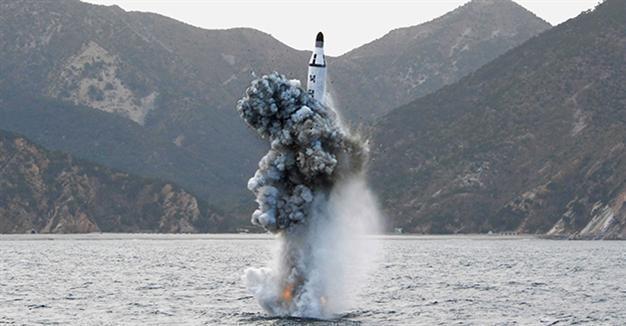N. Korea's Kim hails 'successful' submarine missile test
SEOUL - Agence France-Presse

North Korean leader Kim Jong-Un hailed a submarine-launched ballistic missile (SLBM) test as an "eye-opening success", state media said April 24, declaring Pyongyang has the ability to strike Seoul and the U.S. whenever it pleases.
The launch on April 23 came amid growing concern that Pyongyang is preparing a fifth nuclear test.
But it was followed just hours later by a North Korean offer to impose a unilateral moratorium on nuclear testing if the United States suspends annual military drills with South Korea.
The U.S. and Britain denounced the SLBM test as a violation of UN Security Council resolutions and called on the North to refrain from further moves that could destabilise the region.
The North's state-run KCNA news agency said the test, personally monitored by Kim, confirmed the reliability of the country's underwater launching system.
It also cited the young leader as saying Pyongyang was now capable of "hitting the heads of the South Korean puppet forces and the U.S. imperialists anytime as it pleases."
Still images broadcast on state television showed Kim on the deck of the submarine before watching the test through binoculars from shore and meeting the crew and scientists afterwards.
"This eye-opening success constitutes one more precious gift the defence scientists and technicians are presenting to the great leaders and the party," KCNA quoted Kim as saying.
South Korea's defence ministry said the missile, fired from a submarine in the Sea of Japan (East Sea), flew around 30 kilometres (18 miles) and that the test showed "certain technological progress" in the North's SLBM capability.
"It is believed... that the North would be able to deploy the SLBM weapon within three to four years, or even sooner if it dedicates all its resources on the project," ministry spokesman Moon Sang-Gyun told reporters.
Pictures showed the missile, with "The North Star" emblazoned on it, soar out of the water and fly into the sky, leaving a massive plume of smoke above the sea surface.
State TV also showed what it claimed were underwater images of the missile being ejected from the submarine, using key "cold launch" technology.
North Korea has been pushing to acquire an SLBM capability that would take its nuclear strike threat to a new level, allowing deployment far beyond the Korean peninsula and the potential to retaliate in the event of a nuclear attack.
The isolated country has conducted a number of what it says were successful SLBM tests, but experts had previously question the claims, suggesting Pyongyang had gone little further than a "pop-up" test from a submerged platform.
The latest launch comes as the North gears up for a rare and much-hyped ruling party congress early next month -- the first in 36 years -- at which Kim is expected to take credit for pushing the country's nuclear and missile weapons programme to new heights.
Many analysts and senior Seoul officials have suggested the regime may carry out a fifth nuclear test as a display of defiance and strength ahead of the May party congress.
In an interview with the Associated Press in New York, North Korean Foreign Minister Ri Su-Yong said Pyongyang would be willing to halt further tests if Washington announced an end to annual joint military exercises with Seoul.
South Korea dismissed the proposal and warned it would seek further sanctions for the SLBM test it called an "open provocation".
"We strongly urge the North to... stop making a ridiculous attempt to link our regular joint military drills, which are defensive in nature, with a nuclear test that is banned under UN Security Council resolution," the foreign ministry said in a statement April 24.
The annual drills always raise tensions on the Korean peninsula, with the North condemning them as provocative rehearsals for invasion.
The North made exactly the same offer in January last year, when it was flatly rejected by the United States.
North Korea conducted its fourth nuclear test in January, followed by a rocket launch a month later that was widely seen as a disguised ballistic missile test.
The UN Security Council responded by slapping its strongest sanctions to date on Pyongyang.
 North Korean leader Kim Jong-Un hailed a submarine-launched ballistic missile (SLBM) test as an "eye-opening success", state media said April 24, declaring Pyongyang has the ability to strike Seoul and the U.S. whenever it pleases.
North Korean leader Kim Jong-Un hailed a submarine-launched ballistic missile (SLBM) test as an "eye-opening success", state media said April 24, declaring Pyongyang has the ability to strike Seoul and the U.S. whenever it pleases.